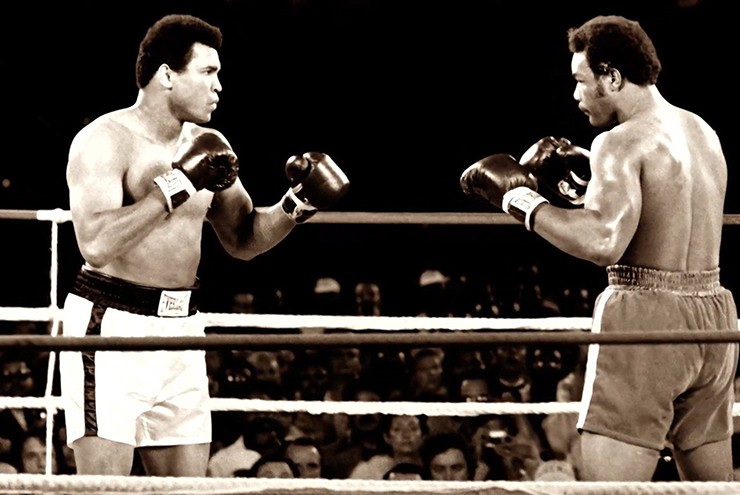“Old General” Ali fights undefeated young Foreman
It’s been 50 years since the “Rumble in the Jungle,” one of the most famous boxing matches in history. On October 30, 1974, in Kinshasa, Zaire (now the Democratic Republic of Congo), Muhammad Ali and George Foreman fought a bout that was memorable in every way, from its tactics, ending, to its cultural impact.
To this day, the match is known as “The Rumble in the Jungle” and is one of the greatest boxing matches of all time.
Ali – Foreman, “The Battle in the Jungle”, October 30, 1974
Ali had become a boxing sensation in the 1960s, but the upheavals in his life and the ban meant he entered the 1970s in a slump. He was no longer as fast as he had been and had to rely on experience against younger, stronger fighters.
Foreman was one such opponent. Foreman was only 25 years old in 1974 and had won all 40 of his professional boxing matches since winning gold at the 1968 Olympics. One of Foreman’s victories was over Joe Frazier, who was undefeated before the fight and had beaten Ali.
Foreman intimidated every opponent with his overwhelming strength, his punches had terrifying force, and at that time any boxer who “survived” 3 rounds with Foreman was considered a surprise. Frazier, then the world champion, but only lasted 2 rounds before being knocked out by Foreman. Everyone believed that Ali would share the same fate.
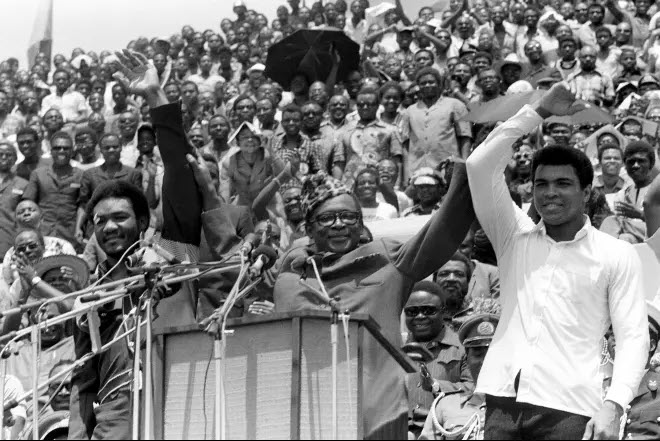
Ali was warmly welcomed by the Congolese people.
The fight took place in the Democratic Republic of Congo, and as usual, Ali taunted Foreman before the fight, saying that Foreman punched like a baby and that he was the greatest. Although both fighters were of African descent, Ali’s charisma made the local crowd enthusiastic, from children to the elderly, from men to women.
Smart strategy
Ali knew Foreman’s power, but no one expected Ali to attack first with a few punches aimed straight at Foreman’s head. Although Foreman was surprised, those punches were ineffective and Foreman began to counterattack late in the first round. However, Ali had his own strategy when it came to this.
Before the fight, Ali told his trainer that he had a strategy for dealing with Foreman. Starting in the second round, Ali would often be on the defensive and lean against the ropes, shielding his head and only allowing Foreman to punch him in the arms or body. That would drain Foreman’s energy with punches that either missed or were not counted.
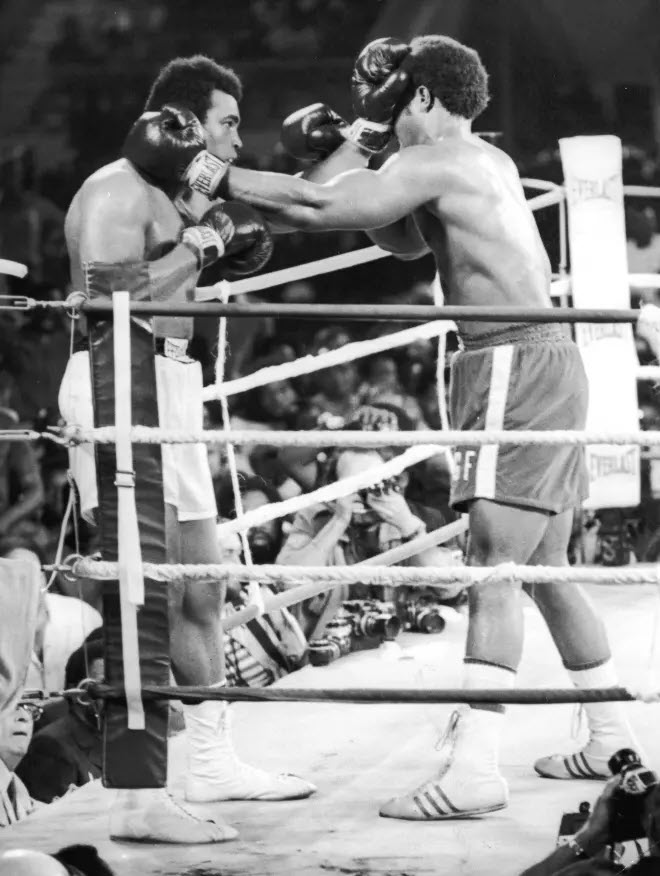
Ali leaned on the ropes and let Foreman exhaust himself with ineffective punches.
As the fight dragged on, Foreman grew tired, while Ali, thanks to the ropes that kept him from getting tired, waited for Foreman to expose his head and punch him, before returning to his defensive stance. When he had the chance, Ali would say a few provocative words to make Foreman even angrier, causing him to continue throwing futile punches.
By round eight, Foreman’s face was showing signs of damage from Ali’s punches. As Foreman attempted to pin Ali to the ropes, Ali seized the opportunity to launch a series of hooks. A powerful right hand sent Foreman crashing to the floor, and although Foreman tried to get up, he could only stand on one leg before the referee ended the fight and declared Ali the winner.
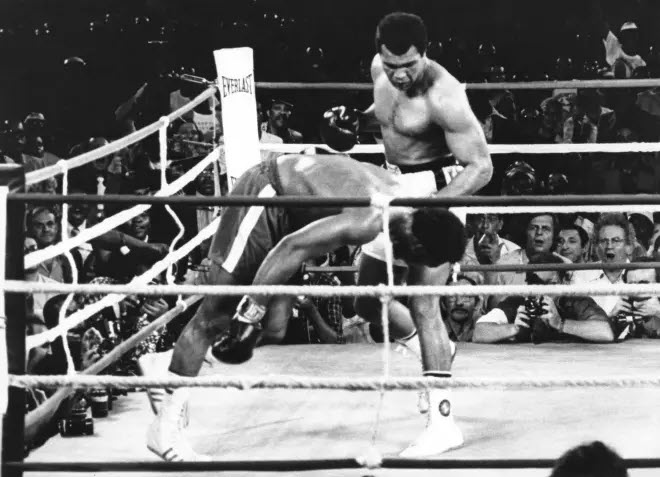
Foreman collapsed after a straight punch to the head from Ali
After the fight, Foreman angrily claimed that someone had drugged his drink, that the ropes had been loosened by Ali to allow Ali to execute his tactics, and that the referee had counted too quickly. However, these accusations were not proven, and viewers saw that Foreman was on the floor for about 11-12 seconds before being declared defeated.
The echo remains forever
Ali returned as world heavyweight champion and continued to dominate until 1978, before retiring in 1981. Before his career ended, Ali began to suffer from Parkinson’s disease and he battled the disease for the next three decades, before passing away in 2016.
Foreman sought to regain his title but abruptly retired in 1977 due to ill health, conversion and a search for religious truth. Ten years later, Foreman returned to boxing and became the oldest heavyweight champion in boxing history at the age of 46, before hanging up his gloves in 1997 at the age of 48. In his final fight, Foreman lost but lasted the full 12 rounds, with many even arguing that he deserved to win on points against the 26-year-old.
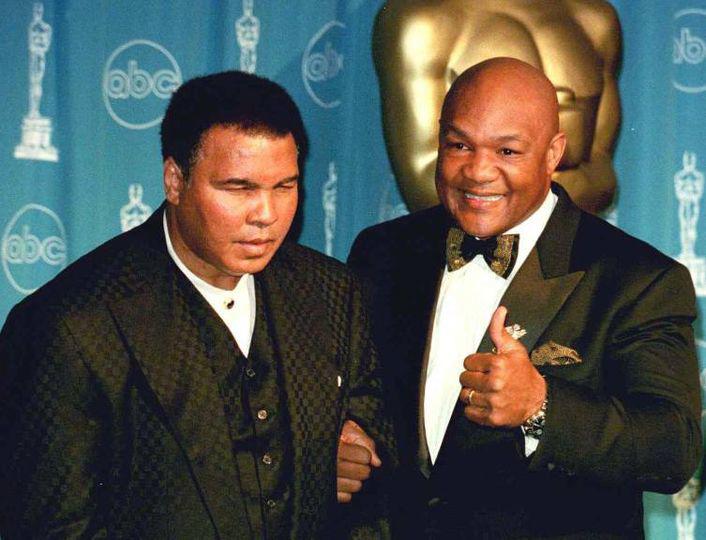
Ali and Foreman at the 1996 Oscars
The Ali-Foreman fight was watched by nearly 1 billion people on television channels around the world, an unprecedented event in history. This fight also inspired the documentary “When We Were Kings” released in 1996. This film won an Oscar, and at the awards ceremony, Foreman himself helped Ali to receive the golden statuette because he suffered from Parkinson’s disease.

